Unit 5 Amazing things重难点、易错点专项梳理课件牛津译林版七年级英语下册(共25张PPT)
文档属性
| 名称 | Unit 5 Amazing things重难点、易错点专项梳理课件牛津译林版七年级英语下册(共25张PPT) | 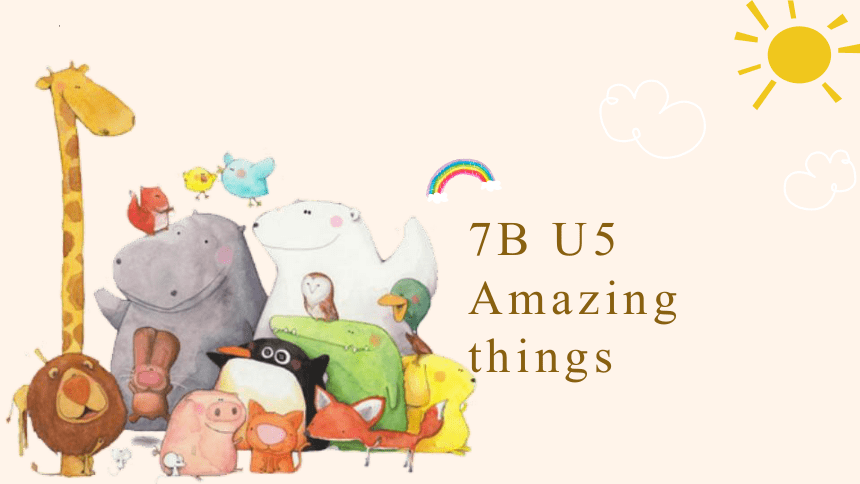 | |
| 格式 | pptx | ||
| 文件大小 | 1.5MB | ||
| 资源类型 | 教案 | ||
| 版本资源 | 牛津译林版 | ||
| 科目 | 英语 | ||
| 更新时间 | 2022-04-17 12:06:12 | ||
图片预览


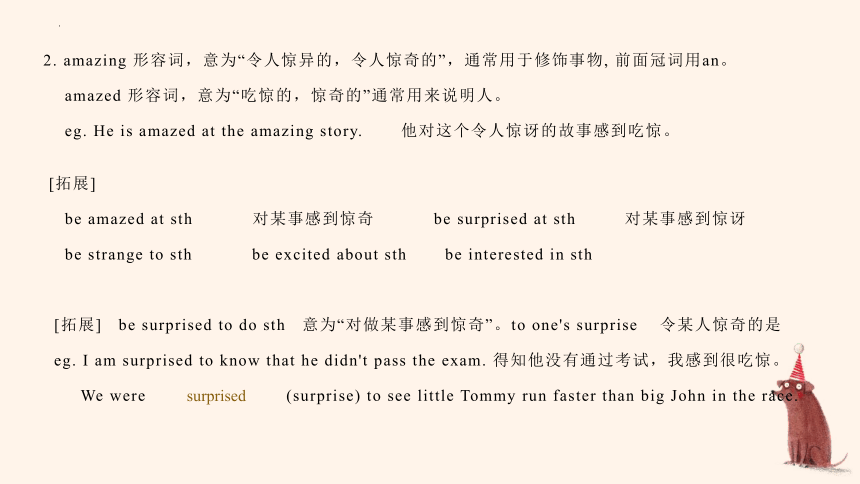
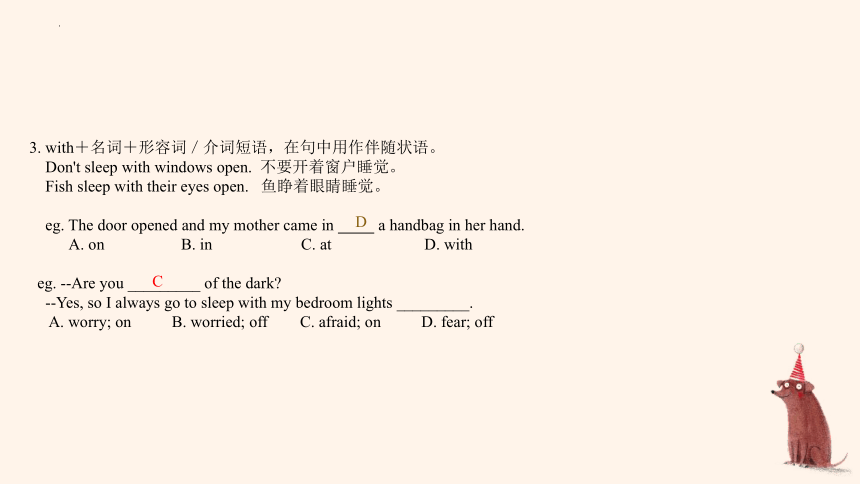
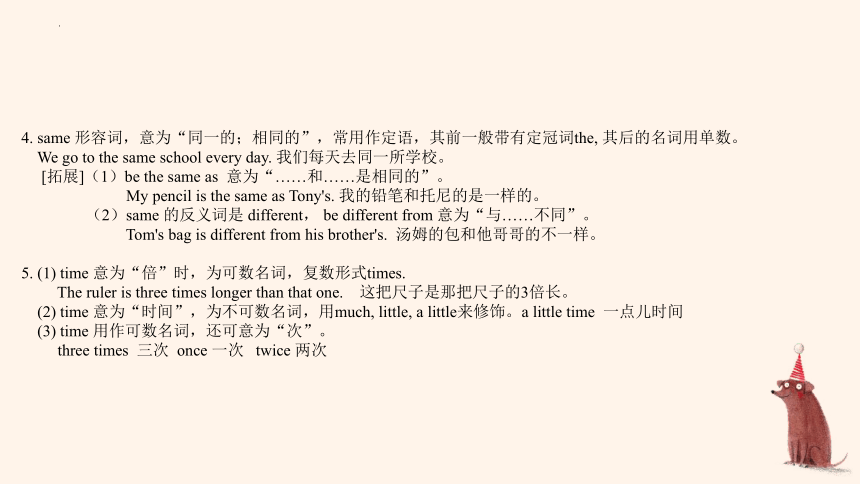
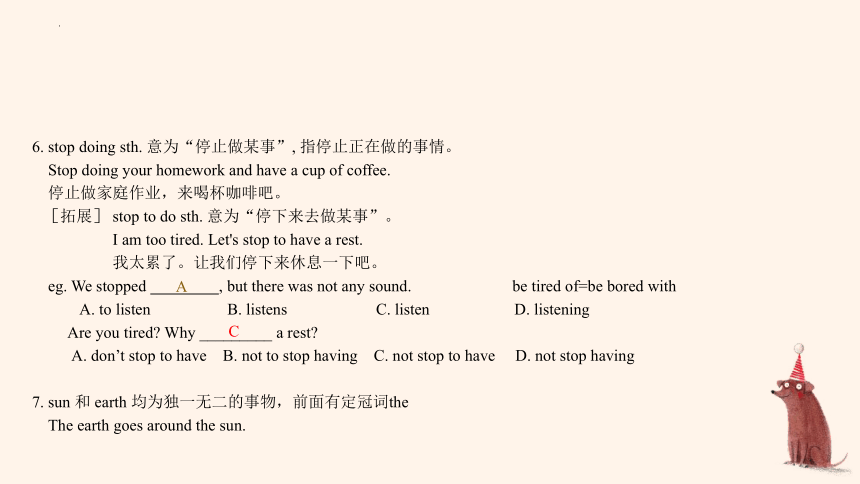
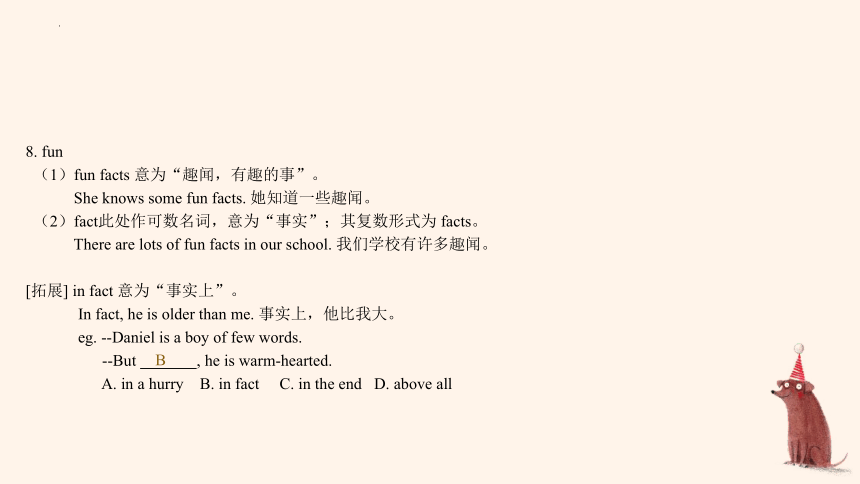
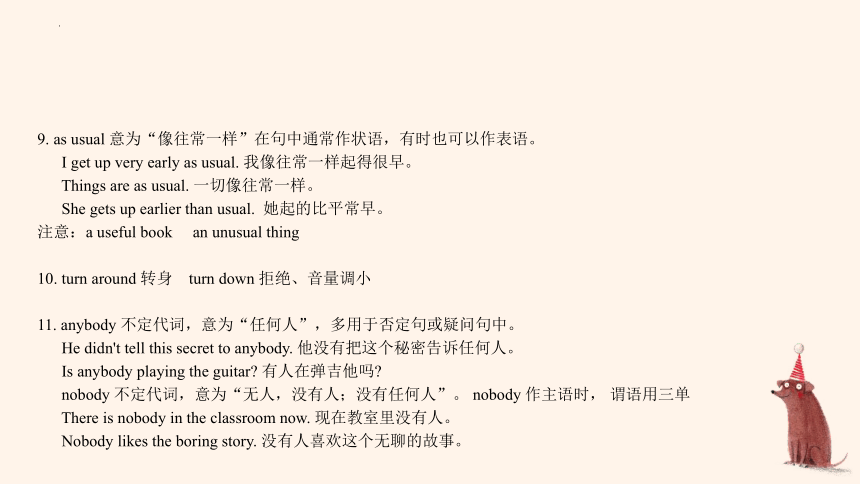
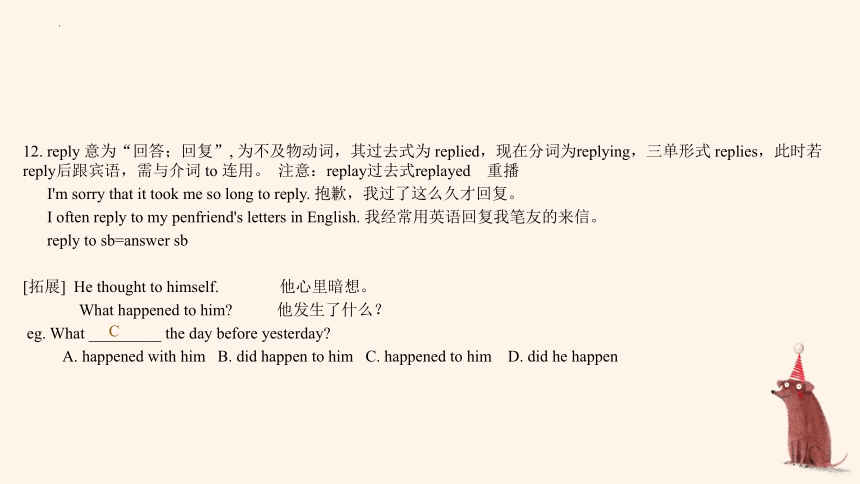
文档简介
(共25张PPT)
7B U5 Amazing things
1. come on 语气词,此处意为“得了吧”,表示责备或不耐烦。还可用于催促他人意为“快点儿;加油”。
Come on, don't sit there dreaming.
得了吧,别坐在那儿空想了。
Come on, Lily! You can catch up with Amy!
加油,莉莉!你可以赶上埃米的!
eg: --Dad. I'm afraid it's too hard.
-- ! You can do it.
A. Well done B. Come on C. Thanks D. You're welcome
B
2. amazing 形容词,意为“令人惊异的,令人惊奇的”,通常用于修饰事物, 前面冠词用an。
amazed 形容词,意为“吃惊的,惊奇的”通常用来说明人。
eg. He is amazed at the amazing story. 他对这个令人惊讶的故事感到吃惊。
[拓展]
be amazed at sth 对某事感到惊奇 be surprised at sth 对某事感到惊讶
be strange to sth be excited about sth be interested in sth
[拓展] be surprised to do sth 意为“对做某事感到惊奇”。to one's surprise 令某人惊奇的是
eg. I am surprised to know that he didn't pass the exam. 得知他没有通过考试,我感到很吃惊。
We were (surprise) to see little Tommy run faster than big John in the race.
surprised
3. with+名词+形容词/介词短语,在句中用作伴随状语。
Don't sleep with windows open. 不要开着窗户睡觉。
Fish sleep with their eyes open. 鱼睁着眼睛睡觉。
eg. The door opened and my mother came in a handbag in her hand.
A. on B. in C. at D. with
eg. --Are you _________ of the dark
--Yes, so I always go to sleep with my bedroom lights _________.
A. worry; on B. worried; off C. afraid; on D. fear; off
D
C
4. same 形容词,意为“同一的;相同的”,常用作定语,其前一般带有定冠词the, 其后的名词用单数。
We go to the same school every day. 我们每天去同一所学校。
[拓展](1)be the same as 意为“……和……是相同的”。
My pencil is the same as Tony's. 我的铅笔和托尼的是一样的。
(2)same 的反义词是 different, be different from 意为“与……不同”。
Tom's bag is different from his brother's. 汤姆的包和他哥哥的不一样。
5. (1) time 意为“倍”时,为可数名词,复数形式times.
The ruler is three times longer than that one. 这把尺子是那把尺子的3倍长。
(2) time 意为“时间”,为不可数名词,用much, little, a little来修饰。a little time 一点儿时间
(3) time 用作可数名词,还可意为“次”。
three times 三次 once 一次 twice 两次
6. stop doing sth. 意为“停止做某事”, 指停止正在做的事情。
Stop doing your homework and have a cup of coffee.
停止做家庭作业,来喝杯咖啡吧。
[拓展] stop to do sth. 意为“停下来去做某事”。
I am too tired. Let's stop to have a rest.
我太累了。让我们停下来休息一下吧。
eg. We stopped , but there was not any sound. be tired of=be bored with
A. to listen B. listens C. listen D. listening
Are you tired Why _________ a rest
A. don’t stop to have B. not to stop having C. not stop to have D. not stop having
7. sun 和 earth 均为独一无二的事物,前面有定冠词the
The earth goes around the sun.
A
C
8. fun
(1)fun facts 意为“趣闻,有趣的事”。
She knows some fun facts. 她知道一些趣闻。
(2)fact此处作可数名词,意为“事实”;其复数形式为 facts。
There are lots of fun facts in our school. 我们学校有许多趣闻。
[拓展] in fact 意为“事实上”。
In fact, he is older than me. 事实上,他比我大。
eg. --Daniel is a boy of few words.
--But , he is warm-hearted.
A. in a hurry B. in fact C. in the end D. above all
B
9. as usual 意为“像往常一样”在句中通常作状语,有时也可以作表语。
I get up very early as usual. 我像往常一样起得很早。
Things are as usual. 一切像往常一样。
She gets up earlier than usual. 她起的比平常早。
注意:a useful book an unusual thing
10. turn around 转身 turn down 拒绝、音量调小
11. anybody 不定代词,意为“任何人”,多用于否定句或疑问句中。
He didn't tell this secret to anybody. 他没有把这个秘密告诉任何人。
Is anybody playing the guitar 有人在弹吉他吗
nobody 不定代词,意为“无人,没有人;没有任何人”。 nobody 作主语时, 谓语用三单
There is nobody in the classroom now. 现在教室里没有人。
Nobody likes the boring story. 没有人喜欢这个无聊的故事。
12. reply 意为“回答;回复”, 为不及物动词,其过去式为 replied,现在分词为replying,三单形式 replies,此时若 reply后跟宾语,需与介词 to 连用。 注意:replay过去式replayed 重播
I'm sorry that it took me so long to reply. 抱歉,我过了这么久才回复。
I often reply to my penfriend's letters in English. 我经常用英语回复我笔友的来信。
reply to sb=answer sb
[拓展] He thought to himself. 他心里暗想。
What happened to him 他发生了什么?
eg. What _________ the day before yesterday
A. happened with him B. did happen to him C. happened to him D. did he happen
C
13. quickly 副词,意为“迅速地;飞快地”。 quickly 的形容词形式为 quick,近义词 fast 。
注意:have a quick breakfast.
14. meet 的过去式 met 。meet 及物动词,意为“遇见,遇到”。
Meet me at 8: 00! 8点钟和我见面!
15. everything 不定代词,“每件事,每件事物;一切” everything 作主语时, 谓语动词用三单。不定代词 everything/something 被形容词修饰时,形容词要后置。 如:something important
Everything is ready now. 现在一切都准备好了。
思考:如何区分none/nothing/no one
[拓展]
eg. -- I'm hungry, Hobo. What's in the fridge -- _________.
A. Nothing B. No C. Anything D. None
There are books and pens on the floor, but there are _______on the desk.
A. not a B. no one C. none D. nothing
指具体人、物时用none, 做主语可单可复。 不知何人与何物时用no one/nothing。no one指人,nothing指物。nothing = not anything no one= nobody; none = not any; not one
no做定语,修饰可数/不可数名词,none只能独立使用,可作主语、宾语、表语
eg. --How much ham is there in the fridge --_______.
A. No B. Not C. None D. No one
eg. There are________ tomatoes on the tables. There are ______ in the basket either.
A. no; none B. no; no C. none; no D. none; none
A
C
A
C
16. careful 为形容词,意为“细心的,谨慎的”。carefully 为副词,意为“仔细地”。
She is careful and she always does everything carefully. 她很谨慎,并且她总是细心地做每件事。
[拓展] careful--carefully careless--carelessly--carelessness
eg. On snowy days, a driver must drive as as possible.
A. fast B. slowly C. wisely D. carefully
17. search 及物动词,意为“搜査,搜索”,三单形式为 searches,过去式为 searched。
eg. He searched the bushes.
[拓展] search sp. for sb./sth. 在某地搜寻某人/某物=search for sb./sth.+介词短语。
She _____________ the Internet _________ some information.
=She ________________ some information ________ the Internet.
searched
for
searched for
on
D
18. bush 可数名词,意为“灌木,灌木丛”,其复数形式为 bushes。
There is a little dog in the bushes. 在灌木丛中有一只小狗。
19. say to oneself 意为“自言自语,心里想”, oneself在句中要与句子的主语保持一致。
“Why am I here ” Jim said to himself. “我为什么在这里?” 吉姆自言自语。
[拓展] oneself 是反身代词,意为“某人自己”。
它的具体形式为:
myself 我自己 yourself 你自己 herself 她自己
himself 他自己 itself 它自己 ourselves 我们自己
themselves 他/她/它们自己 yourselves 你们自己
20. weak 形容词,意为“弱的;虚弱的”,其反义词为 strong,意为“强壮的”。
The young man isn't weak, he is very strong. 这个年轻人不弱,他很强壮。
21. pick up 意为“捡起,拾起”。 pick up为动副结构的短语,后接代词作宾语时,
代词放 在 pick 与 up 的中间;后接名词作宾语时,名词可以放在 pick 与 up 的中间,也可以放在 pick up 之后。
注意:顺便接某人 pick sb up/pick up sb 特例:get on/off it
eg. Pick it up and give it to the policeman. 把它捡起来交给警察。
Please pick up the pen from the floor. =Please pick the pen up from the floor. 请从地板上捡起钢笔。
eg. When he saw a wallet on the ground, he at once.
A. picked it up B. gave it up C. picked up it
A
22. little为形容词时,意为“小的,矮小的,年幼的”,常用来修饰人或动物,带有一定的感彩,指小得可爱。
This is my little sister. 这是我的小妹妹。
[拓展]little 作形容词时,还可意为“少的;不多的”,修饰不可数名词,表达否定意义。
There is little milk in the cup. 杯子里几乎没有牛奶了。
eg. I have the fewest apples. 我有最少的苹果。
23. run away 意为“逃离;跑开”
The thief saw the policeman and ran away quickly. 小偷看到警察,飞快地逃跑了。
[拓展] run away from 表示“从……中逃离”。
We ran away from the big fire. 我们从大火中逃了出来。
24. gave 为动词 give 的过去式, given 过去分词。give 意为“给”,是及物动词。give后面可以接双宾语, 即:
give sb sth = give sth to sb 给某人某物。sb 为间接宾语,sth 为直接宾语。
Mum gave me a big apple =Mum gave a big apple to me 妈妈给了我一个大苹果。
25. ago 副词,意为”以前”。“时间段+ago” 意为 “……之前”,常用于一般过去时。
They met me two days ago. 他们两天前遇到了我。
[拓展] last Sunday 意为“上周日”,是一般过去时的时间状语。类似的词组还有
last night, last week, last Tuesday, last year, last month 等等。当它们出现在句子中时,句子要用一般过去时。
the day before yesterday 意为“前天”,是一般过去时的时间状语。
I called him the day before yesterday. 我前天给他打电话了。
注意:the other day 前几天
26. There were a lot of people there.
句中有两个 there,第一个 there 与 be 构成 there be 句型,意为“有”;第二个 there 是地点副词,意为“在那儿,那儿”在此处作地点状语。
[拓展] there be 句型的过去式为:There was/were…也就是说,直接把be动词变为相应的过去式即可。
There was a park in the city in 1998. 1998年在这个城市里有一个公园。
27. ant 可数名词,意为“蚂蚁”。ant的发音以元音音素开头,表达“一只蚂蚁”时,要用不定冠词an,即 an ant.
28. learn about 意为“得知;了解;获悉”。
I learnt about this car two years ago. 两年前我获悉了这辆车的情况。
[拓展] learn的用法:
① learn to do sth 学习做某事
You can learn to swim in summer. 你可以在夏天学习游泳。
② learn from sb 向某人学习
We should learn from the heroes. 我们应该向英雄们学习。
He learns how to fix the bike from his father.
③ learn… by heart 记住
You had better learn it by heart.你最好记住它。
④ learn… by oneself 自学=teach oneself
Tony learned dancing by himself last year. 去年汤姆自学了跳舞。
29. without 介词,意为“没有”,其后跟名词、代词或动名词。without 后跟人称代词作宾语时,用其宾格形式。
Most plants can't grow without sunshine. 大多数植物没有阳光就不能生长。
I went to school without eating breakfast. 我没吃早饭就去上学了。
注意:with one's help=with the help of sb 在某人的帮助下
30. ask...for 意为“(向…)请求;要”。
I want to ask you for help.我想向你求助。
[拓展] ask sb to do sth 意为“让某人做某事”。 ask sb not to do
My mother asked me to clean my room. 妈妈让我打扫一下自己的房间。
make/let sb (not) do sth
had better (not) do sth 最好不要做某事
31. be afraid of 意为“害怕…...”,其后常跟名词、代词或动词-ing形式。
My little sister is always afraid of dogs. 我的小妹妹一直怕狗。
I'm afraid of failing the exam. 我担心通过不了考试。
[拓展] be afraid to do sth 意为“害怕去做某事”。
I'm afraid to go out alone at night.我害怕夜里独自出去。
eg. ________ you afraid of _________ late for school
A. Are; be B. Are; being C. Do; be D. Do; being
32. not...any more 意为“不再”,相当于 no more.
I'm not a little girl any more. 我不再是一个小女孩了。
With this book, students won't be afraid of learning English any more.
有了这本书,学生们将不再害怕学习英语了。
eg. Please don't your classmates . 请不要再嘲笑你的同学了。
B
laugh at
any more
33. hear of 意为“听说”,相当于 hear about。强调间接听到,翻译为听说
注意:hear from 意为“收到……的来信”。
Did you hear of/about Tom 你听说过汤姆吗?
I heard of / about the news the day before yesterday. 我前天听说了这个消息。
hear+that从句,表示直接听到。
[拓展] 三看一听 see watch notice hear
see sb do/doing sth do表示经常性的,doing表示正在进行
eg. I often hear him play the piano in the room. 我经常听见他在房间弹钢琴。
I see Tom swimming in the swimming pool.
34. two pieces of bread 意为“两片面包”。 a piece of 意为“一片/张……”,常用于表示不可数名词的量。a piece of…变复数时,piece 要变为 pieces,而of 后面的不可数名词不变。
There are some pieces of paper on the desk. 桌子上有几张纸。
Mary is drawing a picture with a piece of chalk on the blackboard.
玛丽正在用一支粉笔在黑板上画画。
35. in use 意为“在使用中”。 be in use=be in service
The new library will be in use next year.
这座新图书馆明年将投入使用。
36. per 意为“每,每一”,用来表示比率,指每一单位的数量、时间或价格等。
There are ten books per 20 students.
每20个学生有10本书。
My brother plays the piano two hours per day.
我的弟弟每天弹钢琴两小时。
37. at least 意为“至少”。at most 至多。
eg. The game is on at least four channels at the same.
至少四个频道同时在播出这场比赛。
38. 做三明治又快又容易吗?
Is it easy and fast to make sandwiches =Is making snadwiches easy and fast
规则动词+-ed的读音
清念 /t/, 元浊/d/;
/t/ /d/ 之后念/id/
说明:
1. 清念 /t/,即 ed 在清辅音后面念 /t/,例: finished helped passed cooked
2. 元浊 /d/,即 ed 在元音,浊辅音后 面念 /d/,例: borrowed enjoyed called moved
3. /t/ /d/ 之后念 /id/,即 ed 在 /t/ /d/ 音后面念 /id/,例: wanted shouted needed
THANKS
7B U5 Amazing things
1. come on 语气词,此处意为“得了吧”,表示责备或不耐烦。还可用于催促他人意为“快点儿;加油”。
Come on, don't sit there dreaming.
得了吧,别坐在那儿空想了。
Come on, Lily! You can catch up with Amy!
加油,莉莉!你可以赶上埃米的!
eg: --Dad. I'm afraid it's too hard.
-- ! You can do it.
A. Well done B. Come on C. Thanks D. You're welcome
B
2. amazing 形容词,意为“令人惊异的,令人惊奇的”,通常用于修饰事物, 前面冠词用an。
amazed 形容词,意为“吃惊的,惊奇的”通常用来说明人。
eg. He is amazed at the amazing story. 他对这个令人惊讶的故事感到吃惊。
[拓展]
be amazed at sth 对某事感到惊奇 be surprised at sth 对某事感到惊讶
be strange to sth be excited about sth be interested in sth
[拓展] be surprised to do sth 意为“对做某事感到惊奇”。to one's surprise 令某人惊奇的是
eg. I am surprised to know that he didn't pass the exam. 得知他没有通过考试,我感到很吃惊。
We were (surprise) to see little Tommy run faster than big John in the race.
surprised
3. with+名词+形容词/介词短语,在句中用作伴随状语。
Don't sleep with windows open. 不要开着窗户睡觉。
Fish sleep with their eyes open. 鱼睁着眼睛睡觉。
eg. The door opened and my mother came in a handbag in her hand.
A. on B. in C. at D. with
eg. --Are you _________ of the dark
--Yes, so I always go to sleep with my bedroom lights _________.
A. worry; on B. worried; off C. afraid; on D. fear; off
D
C
4. same 形容词,意为“同一的;相同的”,常用作定语,其前一般带有定冠词the, 其后的名词用单数。
We go to the same school every day. 我们每天去同一所学校。
[拓展](1)be the same as 意为“……和……是相同的”。
My pencil is the same as Tony's. 我的铅笔和托尼的是一样的。
(2)same 的反义词是 different, be different from 意为“与……不同”。
Tom's bag is different from his brother's. 汤姆的包和他哥哥的不一样。
5. (1) time 意为“倍”时,为可数名词,复数形式times.
The ruler is three times longer than that one. 这把尺子是那把尺子的3倍长。
(2) time 意为“时间”,为不可数名词,用much, little, a little来修饰。a little time 一点儿时间
(3) time 用作可数名词,还可意为“次”。
three times 三次 once 一次 twice 两次
6. stop doing sth. 意为“停止做某事”, 指停止正在做的事情。
Stop doing your homework and have a cup of coffee.
停止做家庭作业,来喝杯咖啡吧。
[拓展] stop to do sth. 意为“停下来去做某事”。
I am too tired. Let's stop to have a rest.
我太累了。让我们停下来休息一下吧。
eg. We stopped , but there was not any sound. be tired of=be bored with
A. to listen B. listens C. listen D. listening
Are you tired Why _________ a rest
A. don’t stop to have B. not to stop having C. not stop to have D. not stop having
7. sun 和 earth 均为独一无二的事物,前面有定冠词the
The earth goes around the sun.
A
C
8. fun
(1)fun facts 意为“趣闻,有趣的事”。
She knows some fun facts. 她知道一些趣闻。
(2)fact此处作可数名词,意为“事实”;其复数形式为 facts。
There are lots of fun facts in our school. 我们学校有许多趣闻。
[拓展] in fact 意为“事实上”。
In fact, he is older than me. 事实上,他比我大。
eg. --Daniel is a boy of few words.
--But , he is warm-hearted.
A. in a hurry B. in fact C. in the end D. above all
B
9. as usual 意为“像往常一样”在句中通常作状语,有时也可以作表语。
I get up very early as usual. 我像往常一样起得很早。
Things are as usual. 一切像往常一样。
She gets up earlier than usual. 她起的比平常早。
注意:a useful book an unusual thing
10. turn around 转身 turn down 拒绝、音量调小
11. anybody 不定代词,意为“任何人”,多用于否定句或疑问句中。
He didn't tell this secret to anybody. 他没有把这个秘密告诉任何人。
Is anybody playing the guitar 有人在弹吉他吗
nobody 不定代词,意为“无人,没有人;没有任何人”。 nobody 作主语时, 谓语用三单
There is nobody in the classroom now. 现在教室里没有人。
Nobody likes the boring story. 没有人喜欢这个无聊的故事。
12. reply 意为“回答;回复”, 为不及物动词,其过去式为 replied,现在分词为replying,三单形式 replies,此时若 reply后跟宾语,需与介词 to 连用。 注意:replay过去式replayed 重播
I'm sorry that it took me so long to reply. 抱歉,我过了这么久才回复。
I often reply to my penfriend's letters in English. 我经常用英语回复我笔友的来信。
reply to sb=answer sb
[拓展] He thought to himself. 他心里暗想。
What happened to him 他发生了什么?
eg. What _________ the day before yesterday
A. happened with him B. did happen to him C. happened to him D. did he happen
C
13. quickly 副词,意为“迅速地;飞快地”。 quickly 的形容词形式为 quick,近义词 fast 。
注意:have a quick breakfast.
14. meet 的过去式 met 。meet 及物动词,意为“遇见,遇到”。
Meet me at 8: 00! 8点钟和我见面!
15. everything 不定代词,“每件事,每件事物;一切” everything 作主语时, 谓语动词用三单。不定代词 everything/something 被形容词修饰时,形容词要后置。 如:something important
Everything is ready now. 现在一切都准备好了。
思考:如何区分none/nothing/no one
[拓展]
eg. -- I'm hungry, Hobo. What's in the fridge -- _________.
A. Nothing B. No C. Anything D. None
There are books and pens on the floor, but there are _______on the desk.
A. not a B. no one C. none D. nothing
指具体人、物时用none, 做主语可单可复。 不知何人与何物时用no one/nothing。no one指人,nothing指物。nothing = not anything no one= nobody; none = not any; not one
no做定语,修饰可数/不可数名词,none只能独立使用,可作主语、宾语、表语
eg. --How much ham is there in the fridge --_______.
A. No B. Not C. None D. No one
eg. There are________ tomatoes on the tables. There are ______ in the basket either.
A. no; none B. no; no C. none; no D. none; none
A
C
A
C
16. careful 为形容词,意为“细心的,谨慎的”。carefully 为副词,意为“仔细地”。
She is careful and she always does everything carefully. 她很谨慎,并且她总是细心地做每件事。
[拓展] careful--carefully careless--carelessly--carelessness
eg. On snowy days, a driver must drive as as possible.
A. fast B. slowly C. wisely D. carefully
17. search 及物动词,意为“搜査,搜索”,三单形式为 searches,过去式为 searched。
eg. He searched the bushes.
[拓展] search sp. for sb./sth. 在某地搜寻某人/某物=search for sb./sth.+介词短语。
She _____________ the Internet _________ some information.
=She ________________ some information ________ the Internet.
searched
for
searched for
on
D
18. bush 可数名词,意为“灌木,灌木丛”,其复数形式为 bushes。
There is a little dog in the bushes. 在灌木丛中有一只小狗。
19. say to oneself 意为“自言自语,心里想”, oneself在句中要与句子的主语保持一致。
“Why am I here ” Jim said to himself. “我为什么在这里?” 吉姆自言自语。
[拓展] oneself 是反身代词,意为“某人自己”。
它的具体形式为:
myself 我自己 yourself 你自己 herself 她自己
himself 他自己 itself 它自己 ourselves 我们自己
themselves 他/她/它们自己 yourselves 你们自己
20. weak 形容词,意为“弱的;虚弱的”,其反义词为 strong,意为“强壮的”。
The young man isn't weak, he is very strong. 这个年轻人不弱,他很强壮。
21. pick up 意为“捡起,拾起”。 pick up为动副结构的短语,后接代词作宾语时,
代词放 在 pick 与 up 的中间;后接名词作宾语时,名词可以放在 pick 与 up 的中间,也可以放在 pick up 之后。
注意:顺便接某人 pick sb up/pick up sb 特例:get on/off it
eg. Pick it up and give it to the policeman. 把它捡起来交给警察。
Please pick up the pen from the floor. =Please pick the pen up from the floor. 请从地板上捡起钢笔。
eg. When he saw a wallet on the ground, he at once.
A. picked it up B. gave it up C. picked up it
A
22. little为形容词时,意为“小的,矮小的,年幼的”,常用来修饰人或动物,带有一定的感彩,指小得可爱。
This is my little sister. 这是我的小妹妹。
[拓展]little 作形容词时,还可意为“少的;不多的”,修饰不可数名词,表达否定意义。
There is little milk in the cup. 杯子里几乎没有牛奶了。
eg. I have the fewest apples. 我有最少的苹果。
23. run away 意为“逃离;跑开”
The thief saw the policeman and ran away quickly. 小偷看到警察,飞快地逃跑了。
[拓展] run away from 表示“从……中逃离”。
We ran away from the big fire. 我们从大火中逃了出来。
24. gave 为动词 give 的过去式, given 过去分词。give 意为“给”,是及物动词。give后面可以接双宾语, 即:
give sb sth = give sth to sb 给某人某物。sb 为间接宾语,sth 为直接宾语。
Mum gave me a big apple =Mum gave a big apple to me 妈妈给了我一个大苹果。
25. ago 副词,意为”以前”。“时间段+ago” 意为 “……之前”,常用于一般过去时。
They met me two days ago. 他们两天前遇到了我。
[拓展] last Sunday 意为“上周日”,是一般过去时的时间状语。类似的词组还有
last night, last week, last Tuesday, last year, last month 等等。当它们出现在句子中时,句子要用一般过去时。
the day before yesterday 意为“前天”,是一般过去时的时间状语。
I called him the day before yesterday. 我前天给他打电话了。
注意:the other day 前几天
26. There were a lot of people there.
句中有两个 there,第一个 there 与 be 构成 there be 句型,意为“有”;第二个 there 是地点副词,意为“在那儿,那儿”在此处作地点状语。
[拓展] there be 句型的过去式为:There was/were…也就是说,直接把be动词变为相应的过去式即可。
There was a park in the city in 1998. 1998年在这个城市里有一个公园。
27. ant 可数名词,意为“蚂蚁”。ant的发音以元音音素开头,表达“一只蚂蚁”时,要用不定冠词an,即 an ant.
28. learn about 意为“得知;了解;获悉”。
I learnt about this car two years ago. 两年前我获悉了这辆车的情况。
[拓展] learn的用法:
① learn to do sth 学习做某事
You can learn to swim in summer. 你可以在夏天学习游泳。
② learn from sb 向某人学习
We should learn from the heroes. 我们应该向英雄们学习。
He learns how to fix the bike from his father.
③ learn… by heart 记住
You had better learn it by heart.你最好记住它。
④ learn… by oneself 自学=teach oneself
Tony learned dancing by himself last year. 去年汤姆自学了跳舞。
29. without 介词,意为“没有”,其后跟名词、代词或动名词。without 后跟人称代词作宾语时,用其宾格形式。
Most plants can't grow without sunshine. 大多数植物没有阳光就不能生长。
I went to school without eating breakfast. 我没吃早饭就去上学了。
注意:with one's help=with the help of sb 在某人的帮助下
30. ask...for 意为“(向…)请求;要”。
I want to ask you for help.我想向你求助。
[拓展] ask sb to do sth 意为“让某人做某事”。 ask sb not to do
My mother asked me to clean my room. 妈妈让我打扫一下自己的房间。
make/let sb (not) do sth
had better (not) do sth 最好不要做某事
31. be afraid of 意为“害怕…...”,其后常跟名词、代词或动词-ing形式。
My little sister is always afraid of dogs. 我的小妹妹一直怕狗。
I'm afraid of failing the exam. 我担心通过不了考试。
[拓展] be afraid to do sth 意为“害怕去做某事”。
I'm afraid to go out alone at night.我害怕夜里独自出去。
eg. ________ you afraid of _________ late for school
A. Are; be B. Are; being C. Do; be D. Do; being
32. not...any more 意为“不再”,相当于 no more.
I'm not a little girl any more. 我不再是一个小女孩了。
With this book, students won't be afraid of learning English any more.
有了这本书,学生们将不再害怕学习英语了。
eg. Please don't your classmates . 请不要再嘲笑你的同学了。
B
laugh at
any more
33. hear of 意为“听说”,相当于 hear about。强调间接听到,翻译为听说
注意:hear from 意为“收到……的来信”。
Did you hear of/about Tom 你听说过汤姆吗?
I heard of / about the news the day before yesterday. 我前天听说了这个消息。
hear+that从句,表示直接听到。
[拓展] 三看一听 see watch notice hear
see sb do/doing sth do表示经常性的,doing表示正在进行
eg. I often hear him play the piano in the room. 我经常听见他在房间弹钢琴。
I see Tom swimming in the swimming pool.
34. two pieces of bread 意为“两片面包”。 a piece of 意为“一片/张……”,常用于表示不可数名词的量。a piece of…变复数时,piece 要变为 pieces,而of 后面的不可数名词不变。
There are some pieces of paper on the desk. 桌子上有几张纸。
Mary is drawing a picture with a piece of chalk on the blackboard.
玛丽正在用一支粉笔在黑板上画画。
35. in use 意为“在使用中”。 be in use=be in service
The new library will be in use next year.
这座新图书馆明年将投入使用。
36. per 意为“每,每一”,用来表示比率,指每一单位的数量、时间或价格等。
There are ten books per 20 students.
每20个学生有10本书。
My brother plays the piano two hours per day.
我的弟弟每天弹钢琴两小时。
37. at least 意为“至少”。at most 至多。
eg. The game is on at least four channels at the same.
至少四个频道同时在播出这场比赛。
38. 做三明治又快又容易吗?
Is it easy and fast to make sandwiches =Is making snadwiches easy and fast
规则动词+-ed的读音
清念 /t/, 元浊/d/;
/t/ /d/ 之后念/id/
说明:
1. 清念 /t/,即 ed 在清辅音后面念 /t/,例: finished helped passed cooked
2. 元浊 /d/,即 ed 在元音,浊辅音后 面念 /d/,例: borrowed enjoyed called moved
3. /t/ /d/ 之后念 /id/,即 ed 在 /t/ /d/ 音后面念 /id/,例: wanted shouted needed
THANKS
